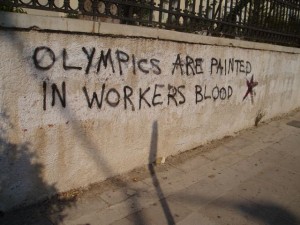Images of the collapsed footbridge neighbouring New Delhi’s Jawaharlal Nehru main stadium have made front-page news across the globe and shone unflattering light on India’s Commonwealth Games preparation. The Games, which are due to begin in under two weeks on the 3rd October, have been dogged by whispers of corruption, corner-cutting and a lack of leadership. Such whispers have recently descended into deafening shouts as concerns are voiced, by laymen and ministers alike, about the quality of construction efforts. Newly-erected buildings have been left in varying states of dilapidation due to annual monsoons, and the athletes’ village has been denounced as unfit for habitation.
It is possible that such a high-profile setback may become a symbol of the dangers of rushing regeneration into cities and societies unready for it, given that it has ultimately caused more destruction than good and more haste has resulted in less speed. Similarly, another footbridge closer to home, though still un-built, has also caused destruction. Manor Gardens in East London, a 100-year-old allotment, was wiped off the map for an Olympic footbridge, and though this footbridge may not fall apart, the loss of this historic and green site is perhaps a troubling indicator in itself of progress for the sake of thinly-defined progress.
If the concept, as well as the spirit of jugad is alive and well (the idea that things will get done, by hook or by crook), then organisers may be hoping that what is quickly turning into a Commonwealth debacle is only an exception that proves the rule.
Click London Olympics for more blogs
See our Olympics project pages for more information and videos.
Or visit PlanA our general blog on urbanism, planning and architecture.
Spectacle homepage
Befriend Spectacle.Docs on Facebook
Follow SpectacleMedia on Twitter



